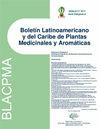利用野生植物治疗羊驼疾病的祖传知识
IF 0.7
4区 医学
Q4 INTEGRATIVE & COMPLEMENTARY MEDICINE
Boletin Latinoamericano y del Caribe de Plantas Medicinales y Aromaticas
Pub Date : 2023-09-30
DOI:10.37360/blacpma.23.22.5.46
引用次数: 0
摘要
在安第斯高原地区,主要的经济活动是羊驼饲养,这受到各种传染病和寄生虫病的影响。农村人口经常求助于具有多种特性并有助于控制各种疾病的野生植物。目的是记录野生植物在普诺和阿雷基帕地区安第斯高原地区控制羊驼疾病方面的使用情况。在5个地区采访了50个羊驼养殖户。共报道16科32种,以菊科和豆科最多。最常见的疾病是腹泻、肺炎、发热和肠道寄生虫病。治疗腹泻最常用的植物是毛霉、黄霉和丝毛霉,治疗肺炎最常用的植物是prostrata .和病毒G.,治疗肠道寄生虫最常用的植物是tricuneatb .和daucifolil .,清除体外寄生虫(虱子)最常用的植物是密实A.。对于所有疾病,成人的治疗剂量都高于新生儿,并且在雨季使用。在急性病条件下,农村家庭选择药物。野生植物是治疗羊驼各种疾病的可行和可持续的替代品。本文章由计算机程序翻译,如有差异,请以英文原文为准。
Ancestral knowledge on the use of wild plants for the treatment of diseases in alpacas
In the high Andean areas, the main economic activity is alpaca raising, which is affected by various infectious and parasitic diseases. Rural populations often resort to wild plants that have diverse properties and help control various diseases. The objective was to document the uses of wild plants in the control of alpaca diseases in the high Andean areas of the Puno and Arequipa regions. Fifty alpaca-breeding families were interviewed in five localities. Thirty-two species belonging to 16 families were reported, with the Asteraceae and Fabaceae families having the highest number of species. The most frequently treated pathologies were diarrhea, pneumonia, fever and enteric parasitosis. For diarrhea treatment, the most used plants were M. mollis, S. nutansand T. filifolia, for pneumonia were G. prostrataand G. viravira, for enteric parasitosis were B. tricuneataand L. daucifoliaand for the elimination of ectoparasites (lice) was A. compacta. For all diseases, the treatment dose was higher in adults than in neonates and its application is in the rainy season. In acute disease conditions, rural families choice to drugs. Wild plants are a viable and sustainable alternative for the treatment of various diseases in alpacas.
求助全文
通过发布文献求助,成功后即可免费获取论文全文。
去求助
来源期刊

Boletin Latinoamericano y del Caribe de Plantas Medicinales y Aromaticas
PHARMACOLOGY & PHARMACY-
CiteScore
1.30
自引率
14.30%
发文量
49
审稿时长
6-12 weeks
期刊介绍:
The Boletín Latinoamericano y del Caribe de Plantas Medicinales y Aromáticas (BLACPMA), [Latin American and Caribbean Bulletin of Medicinal and Aromatic Plants]; currently edited by the publishing house MS-Editions, is a bi-monthly international publication that publishes original peerreviewed research in the field of medicinal and aromatic plants, with nearly 20 years of experience. BLACPMA is a scientific journal that publishes two types of articles: Reviews (only in English) and Original Articles (Spanish or English), its main lines of action being agronomy, anthropology and ethnobotany, industrial applications, botany, quality and standardization, ecology and biodiversity, pharmacology, phytochemistry, pharmacognosy, regulatory and legislative aspects. While all areas of medicinal plants are welcome and the experimental approaches used can be broad and interdisciplinary; other areas of research that are not mentioned depend on the Editorial Committee for their acceptance.
 求助内容:
求助内容: 应助结果提醒方式:
应助结果提醒方式:


